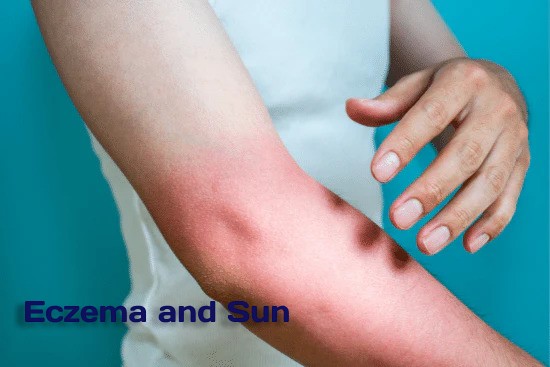Introduction
Eczema is a chronic skin condition that affects millions of people worldwide. For those with eczema, managing flare-ups and finding effective treatments is a constant struggle. One of the most common questions people with eczema ask is, Is sun good for eczema? The answer isn’t straightforward, as the sun’s rays and eczema have a complicated relationship. In this article, we’ll explore the benefits and risks of sun exposure for eczema sufferers, so you can decide whether sunlight should be part of your eczema management plan.
What is Eczema?
Eczema, also known as atopic dermatitis, is a condition that causes the skin to become inflamed, itchy, and irritated. The exact cause of eczema is still unclear, but it is believed to be linked to a combination of genetic and environmental factors. The skin’s natural barrier is often compromised, leading to dryness and sensitivity.
There are different types of eczema, including:
- Atopic Eczema: The most common form, often associated with a family history of allergies or asthma.
- Contact Dermatitis: Triggered by skin contact with allergens or irritants.
- Seborrheic Dermatitis: Affects areas with a high density of sebaceous glands, such as the scalp.
The condition can range from mild to severe, and flare-ups can occur in response to various triggers, including weather, stress, and irritants like certain soaps or fabrics.
The Sun and Skin Health
When we think about the sun and our skin, we often think about the harmful effects of ultraviolet (UV) rays, including sunburns and premature aging. However, the sun also plays a vital role in skin health. The sun’s rays, specifically UVB rays, trigger the production of Vitamin D, which is crucial for bone health and immune function.
However, just like with anything, moderation is key. Too much exposure to the sun can cause damage to the skin, especially for people with sensitive skin conditions like eczema. The key is finding the right balance between getting enough sun exposure for its benefits and protecting your skin from its potential harm.
Can Sun Exposure Help Eczema?
The question Is sun good for eczema? is a common one, and the answer is yes, but with caveats. Several studies have indicated that moderate sun exposure can help alleviate eczema symptoms. One of the main reasons for this is that sunlight has anti-inflammatory effects that can calm eczema flare-ups. UV light can suppress the immune system’s overactive response, which is often the underlying cause of eczema symptoms.
People with eczema often have an overactive immune response, leading to inflammation and skin irritation. By exposing the skin to the sun, it may help to “retrain” the immune system, reducing inflammation and making the skin less reactive.
Some studies have also shown that people who suffer from eczema tend to have lower levels of Vitamin D, which is primarily obtained through sunlight. Therefore, getting enough sun can help replenish Vitamin D levels and support overall skin health.
How Sunlight Affects the Immune System
Our immune system plays a critical role in the development and management of eczema. When the immune system overreacts to harmless triggers, it can cause inflammation, leading to eczema flare-ups. Sunlight, specifically UV light, has been shown to have immunosuppressive effects, which means it can help reduce the overactivity of the immune system.
By exposing the skin to sunlight, we may be able to lower the intensity of the immune response, which in turn reduces inflammation. This could potentially lead to fewer eczema flare-ups and a less severe condition overall. However, it’s important to note that excessive sun exposure can have the opposite effect, so moderation is key.
The Risks of Sun Exposure for Eczema
While sunlight can be beneficial for eczema, it’s not without its risks. Overexposure to the sun can lead to sunburn, which is particularly damaging to sensitive skin. For people with eczema, sunburn can exacerbate the condition, causing further irritation, redness, and peeling.
Additionally, excessive sun exposure can also dry out the skin, which is already prone to dryness due to eczema. This can make eczema symptoms worse, leading to cracking and bleeding of the skin, which can be painful and prone to infection.
It’s also important to remember that some people with eczema are more sensitive to sunlight than others. If you have fair skin or a history of sunburns, you may need to be more cautious when exposing your skin to the sun.
How to Safely Get Sun Exposure for Eczema
If you want to incorporate sun exposure into your eczema management routine, it’s important to do so safely. Here are some tips for getting the most benefit from the sun without risking damage to your skin:
- Limit your sun exposure: Start with short periods of exposure (15–20 minutes) and gradually increase the duration if needed.
- Use sunscreen: Choose a sunscreen that is gentle and fragrance-free to avoid irritation. Mineral sunscreens containing zinc oxide or titanium dioxide are often the best choice for sensitive skin.
- Wear protective clothing: Hats, sunglasses, and long sleeves can protect your skin from overexposure.
- Stay hydrated: Sun exposure can lead to dehydration, which can worsen eczema symptoms, so drink plenty of water.
Treatment Options for Eczema with Sun Exposure
Incorporating sun exposure into your eczema treatment plan can be helpful, but it should not replace other forms of treatment. Here are some additional ways to manage eczema symptoms:
- Topical corticosteroids: These can help reduce inflammation and control flare-ups.
- Moisturizing regularly: Use a fragrance-free cream to keep your skin hydrated and prevent dryness.
- Phototherapy: For some people, controlled UV light therapy under the supervision of a dermatologist can be effective in treating eczema.
When Not to Get Sun Exposure
Not everyone with eczema will benefit from sun exposure, and in some cases, it may make the condition worse. If you have open wounds, infections, or your eczema is in a flare-up, it’s best to avoid the sun until your skin has healed. Additionally, people with certain types of eczema, like photosensitive eczema, may experience worsening symptoms when exposed to the sun.
Managing Eczema in Different Seasons
Sun exposure has a different impact depending on the season. During the summer, increased UV exposure can help alleviate symptoms, but it’s important to balance this with sun protection. In winter, eczema may worsen due to cold air and dry indoor heating. To prevent flare-ups, use a humidifier and moisturize more frequently.
The Role of Diet in Managing Eczema and Sun Exposure
Your diet can also play a role in managing eczema. Foods rich in Omega-3 fatty acids, such as fish and flaxseeds, can help reduce inflammation. Additionally, Vitamin D-rich foods like eggs and fortified dairy products can support the benefits of sunlight exposure. Avoiding triggers like dairy or gluten may also help some people manage their eczema more effectively.
Lifestyle Changes for Eczema Management
Incorporating lifestyle changes, such as reducing stress, improving sleep quality, and following a skincare routine that includes sun protection, can all help in managing eczema. Staying active and maintaining a healthy lifestyle will also contribute to better skin health.
Should You Consult a Doctor Before Sunbathing?
If you’re considering using sun exposure as a treatment for eczema, it’s a good idea to consult with a dermatologist. A professional can help you understand how your skin might react to sunlight and advise you on the best course of action.
Conclusion
So, Is sun good for eczema? In moderation, yes. Sun exposure can provide benefits like reducing inflammation and boosting Vitamin D levels, both of which can help manage eczema. However, it’s important to balance sun exposure with skin protection to avoid worsening the condition. Always consult a healthcare professional to ensure you’re using sunlight safely as part of your eczema treatment plan.








